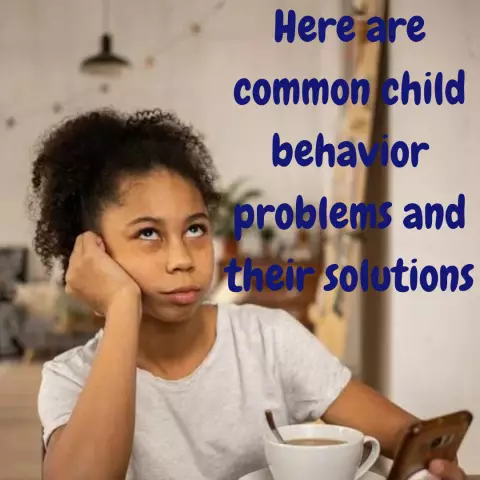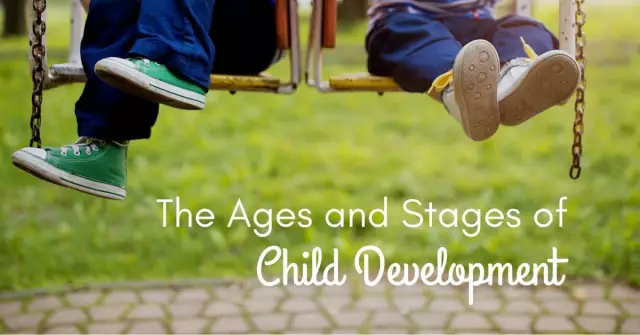- Author Rachel Wainwright [email protected].
- Public 2023-12-15 07:39.
- Last modified 2025-11-02 20:14.
Features of the child's behavior
The characteristics of a child's behavior are primarily determined by his mental development. In recent decades, this aspect has been viewed from the point of view of the relationship between mother and child as a single system. In most cases, parents raise children based on personal experience and understanding of life. Without the necessary knowledge in child psychology, situations often arise when the behavior of children puzzles parents. Neither the motives of such behavior, nor the way out of the current situation become clear.

Considering the features of a child's behavior, it is necessary, first of all, to keep in mind that each child is unique in its own way. It has its own advantages and disadvantages. There are various classifications that distinguish the most typical behavior of children. They are based on the characteristics of mental development and temperament.
When assessing the characteristics of a child's behavior, one must understand that, depending on the situation, one and the same character trait can be regarded as a virtue and vice versa. A rather striking example is shyness, when under certain conditions it is interpreted as politeness and modesty, and in others as restraint associated with low self-esteem.
Factors affecting the behavior of the child
In addition to innate character traits and temperament, determining the characteristics of a child's behavior, two interrelated aspects of a child's development can be distinguished:
- Physiological development, which includes the satisfaction of the physiological need for physical comfort, food, movement and experience, which are necessary for the development of the nervous system. In the framework of the research it was found that the satisfaction of the physiological needs of the child is necessary, but not sufficient for his full development;
- Emotional-personal and cognitive development of a child, which is based on the corresponding concrete-cultural model of society. Modern psychologists say that the characteristics of a child's behavior are largely determined by the influence of the cultural and individual characteristics of the mother.
Features of the behavior of shy children
Shy, indecisive and shy children usually have one thing in common - low self-esteem. When faced with unfamiliar phenomena, they are usually frightened or annoyed, seeking maternal support and protection.
When raising a child, you need to try not to aggravate shyness, but rather to smooth it out. For this, it is necessary to develop the creative potential that such children usually possess. Taking into account the peculiarities of the child's behavior, parents and teachers should pay attention to such positive traits as observation, diligence and an increased sense of responsibility.
Features of the behavior of children with mental retardation
Quite often, situations arise when parents notice that the growing baby lags behind in development from their peers - later they begin to stand, sit, talk, and also behave inadequately in the children's team. Also, it should be an alarming signal that the baby cannot concentrate and is often distracted. With such features of the child's behavior, it is better for parents to consult with a specialist, as this may indicate a mental retardation (MAD).
The behavior of children with CRD needs to be corrected from early childhood. For this, special programs have been developed to prepare a child for school. Otherwise, he will certainly have difficulties not only with training, but also with communication. This will lead to the fact that he will receive many comments from teachers and ridicule from classmates, which will be an impetus for the appearance of other symptoms - low self-esteem, resentment and anxiety.
According to various estimates, up to 20% of children experience learning difficulties in primary grades. However, only a neuropsychiatrist can determine that it is the delay in mental development that is the reason. At the same time, it should be understood that the behavior of children with mental retardation, with correct correction, is not the reason for studying in a specialized school. Even with a slower pace of perception and processing of incoming information, a child can be taught to plan his activities and foresee the result of his activities.
Features of the behavior of a hyperactive child
Quite often, the child's increased physical activity is the reason for seeking help from doctors. Often the cause of hyperactivity is various diseases, including diseases of the nervous system.

However, in most cases, doctors note that upbringing defects are the basis of conflict and inappropriate behavior. In most cases, the cause of a hyperactive child's behavior is:
- Too strict authoritarian parenting style;
- Upbringing in which excessive care prevails, which does not allow obtaining the life experience necessary for development;
- Lack of uniform requirements and attitude towards children, depending on the state of health and mood.
The main features of the behavior of a hyperactive child are restlessness, insufficient concentration of attention, aggressiveness and conflict. However, constant remarks and reproaches only exacerbate the situation, since they contribute to the formation of an inferiority complex.
Such children experience certain difficulties in the children's team, where even the best teacher simply does not have enough time and energy to raise a hyperactive child. Taking into account the peculiarities of the child's behavior and realizing the future difficulties, parents should seek help from a child psychologist who will help find the right approach to the baby and correct his behavior.
Quite often, the conflict behavior of the child indicates problems in the relationship between the parents, then the help of a family psychologist is simply necessary. At the same time, for the sake of their future baby, parents should be ready to notice their mistakes and change their behavior.
In addition to the described features of the child's behavior, teachers and psychologists will also highlight such as:
- Slowness. Children with this mentality need to be helped to overcome complexes associated with the fact that it is difficult for them to get involved in work and move from one business to another;
- Capriciousness. With this type of behavior, parents should draw the child's attention to the fact that not only with the help of demands and whims can you achieve your goals. At the same time, it is important to involve such children in family affairs in which they feel like full participants;
- Closure. Introverted children, unlike shy ones, do not want to communicate. Usually, the reasons for this behavior lie in fear of strangers, prolonged anxiety and inability to behave in an unfamiliar situation.
When raising a child, parents must understand that there is no universal correct method. In any case, the most important thing is love, care and genuine interest in the child. And only then knowledge based on the characteristics of the child's behavior will help to grow a full-fledged and versatile personality.
Found a mistake in the text? Select it and press Ctrl + Enter.






